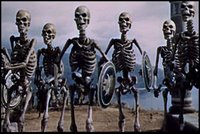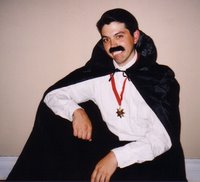The movie opens with a close-up on a pair of lips, pauses, and then begins. It's an appropriate image to begin on, seeing as the movie deals with the power of words, and the lips are as shocking and compelling as a gun barrel pointed right at us.
Lenny is nearly a masterpiece, the ultimate biopic with such a steady, focused gaze and a remarkable point of view that never betrays itself. It's undone only by an ending that feels too rushed, jumping ahead to Lenny Bruce's death too quickly and then ignoring the facts of Lenny Bruce's death to explore the why. Having said this, it's remarkable that it ends on an image as appropriate as the lips that greet us, a single image of Bruce's corpse that adds one final wrinkle of meaning to this story of the man's life.
The movie understands, where most biopics don't, that if you're going to find meaning from one man's life, you have to pick a point of view to watch him from. What's superb about Lenny's point-of-view is that it takes place after his death, intermingling moments from late in his life with earlier moments and showing, through some really delicious editing, how these two points relate, how they speak to each other, and how they affect one another. Combine this with faked, mocumentary style interviews with actors portraying the people in Bruce's life talking about the effect that he's had on them and how they impacted his life at certain crosspoints, and you have a rich, powerful tapestry about, as the movie would have it, a flawed, yet insightful spokesperson for the freedom of speech.
Dustin Hoffman blasts out of the atmosphere with his performance as Bruce, goes to the moon, and comes back to trade rocks. He's freakishly good, impassioned and hurting, a fact no more apparent than in the scene when he attempts to perform while high on heroin. The camera's locked down in a wide shot of the stage as Hoffman stumbles about, unable to string coherent thoughts together, and desperate to be loved. The way it's shot is painful enough for anyone who's had a bad experience on a stage, the unblinking camera watches every mistake as attentively as the audience, but Hoffman's spot-on delivery makes it even more so. After a few unsuccessful attempts at doing his act, he whispers into the microphone a barely audible, "I'm not funny," and walks off.
This is the second Bob Fosse movie I've reviewed for One Movie a Day, and I will say this about his work: he knows how to cut a movie. Even with the vast amount of overindulgences featured in All That Jazz, the movie, like this one, had some powerful contrapuntal moments in the edit. And, here, the cutting works well at aping the style of a Lenny Bruce performance, moving rapidly from one thought to the next and then slowing down to savor a particularly juicy bit. It's effective and nearly maddeningly intense.
I loved this movie. Smart, funny, and well crafted, it vaults over nearly every other biopic I've ever seen and stands out as one of the greatest, most sincere movies about the agonizing futility (and necessity) of fighting a society's fear of certain words with those very same words.
Friday, December 02, 2005
Day 63: Lenny
MONSTER FIGHT!
During the car ride to work today, Tara and I continued two discussions we've had in the past. Both are relatively related enough that I feel I should share them. The first discussion was centered on the character of reanimated skeletons, and how, it seems, that these skeletons are all entertainers. It often seems that these skeletons get reanimated because of a greedy lust for life. Think about it: reanimated skeletons are constantly presented as singing, playing the xylophone and dancing rickety, herky-jerky dances in order to scare the dickens out of janitors or trespassers. It occurs to me as I type this that some of them are warriors, but even then they always seem to be delighted about the fighting, like it's a well-rehearsed performance. Not to mention the fact that they always lose. I think they're not so much warriors as they're like the team the Harlem Globetrotters play. And it's such an honor to share the battleground with Achilles! We also questioned whether skletons would ride a bicycle.
The first discussion was centered on the character of reanimated skeletons, and how, it seems, that these skeletons are all entertainers. It often seems that these skeletons get reanimated because of a greedy lust for life. Think about it: reanimated skeletons are constantly presented as singing, playing the xylophone and dancing rickety, herky-jerky dances in order to scare the dickens out of janitors or trespassers. It occurs to me as I type this that some of them are warriors, but even then they always seem to be delighted about the fighting, like it's a well-rehearsed performance. Not to mention the fact that they always lose. I think they're not so much warriors as they're like the team the Harlem Globetrotters play. And it's such an honor to share the battleground with Achilles! We also questioned whether skletons would ride a bicycle.
We all know they like motorcycles, but a bicycle is a different story. Tara contended that the ones who rode motorcycles were the skeletons we always got to see, in other words, the more successful skeletons, whereas a "normal" skeleton wouldn't be able to afford it. I argued that a bicycle might be too dangerous for a skeleton because, if it were to fall, it would explode into a million pieces. She rightly countered that the same is true for a motorcycle. I conceded this point and we shifted the discussion to where a skeleton might like to live. We decided on basement apartments. 
The second discussion was a hotly debated topic as to who would win in a fight between a dracula and a wolf-man. I originally sided with the wolf man because draculas are far too prissy and a wolf-man's raw power would be the decisive factor. However, this morning I remembered that draculas have dominion over some beasts and so would probably have some degree of mind control over the wolf-man. I think we left it that neither one would be able to kill the other, so the end result would be that the two would simply fuck each other up.
Thoughts?

